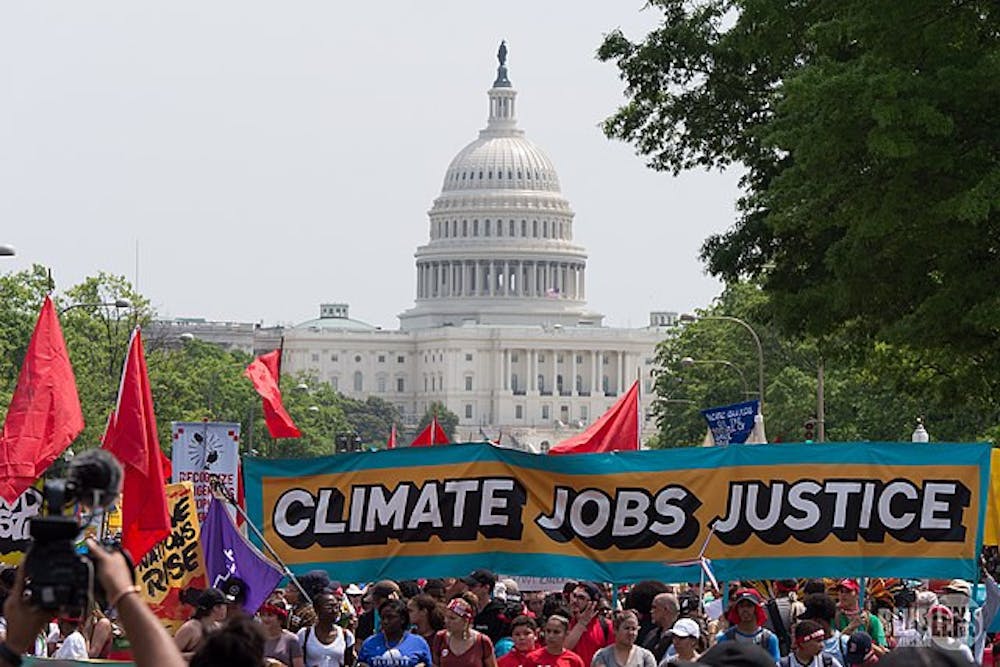When we mention to people back home that we go to Hopkins, many of us are asked if we want to be doctors. While it is true that pre-med culture is prominent on campus and Hopkins is renowned for its medical institution, the University is strengthening its reputation of academic excellence in the social sciences.
On Friday, Oct. 6, University President Ronald J. Daniels announced the new School of Government and Policy located at the Johns Hopkins University Bloomberg Center at 555 Pennsylvania Avenue in D.C. The school will open by the fall of 2026 and will offer graduate and doctorate degrees focusing on domestic policy.
This new venture is the latest in the University’s encouragement of academic discourse around civic responsibility. The Stavros Niarchos Foundation (SNF) Agora Institute recently unveiled a new minor in Civic Life, with a focus on strengthening the capacity for civic engagement among individuals from all academic backgrounds. On Oct. 5, the Institute announced that it received a $6 million grant from the U.S. Department of Defense to support efforts to enhance civic education, especially for STEM students.
In addition, the Center for Economy and Society within the SNF Agora Institute announced a new major in Moral and Political Economy. The interdisciplinary program will prioritize understanding economic problems through their political, moral and social contexts.
Hopkins expanding its academic expertise beyond STEM is a change that we wholeheartedly welcome, and we hope the University’s efforts will challenge the perception of Hopkins as solely a leader in STEM fields.
We would like to see the school not simply added, but integrated. The Hopkins academic community should use the new School of Government and Policy as an opportunity to improve cross-disciplinary dialogue.
STEM and social sciences go hand in hand; furthering one furthers the other. In order for any field of research to be successful, there needs to be effective governance and allocation of resources. Political actors must understand that their decisions are tied to progress in scientific fields and society at large. Furthermore, a robust understanding of civic engagement can also help scientists and medical professionals more effectively engage the public and policymakers.
Perhaps we could have seen less confusion during the COVID-19 pandemic if politicians had been able to push aside their own ignorance and work with public health experts, rather than against them.
Despite statistics showing a reduction in COVID-19 hospitalizations as a result of vaccines and mask mandates, some political figures still publicly opposed these preventative measures. Florida Governor Ron DeSantis avoided implementing pandemic-related guidelines and claimed his actions to be for the protection of the freedom of Florida.
Political figures’ disregard for empirical evidence can cloud constituents’ health judgments. The politicization of a pandemic can keep important health guidance from reaching vulnerable populations and increase public distrust of the scientific and medical fields.
The COVID-19 vaccine was developed with unprecedented speed and was a resounding STEM success. Although the vaccine was a technical success, the same cannot be said for the vaccine rollout, due to government failures in distribution and rampant misinformation.
The pandemic demonstrates the issues that arise when scientists and policymakers cannot work together effectively. But when they do, there is the potential for tremendous good. Out of the 954 Nobel laureates throughout history, 261 have received funding from the National Science Foundation (NSF) at some point in their careers. The NSF (and federal scientific funding in general) is essential for equipping scientists with the necessary tools to make discoveries that can be harnessed for the betterment of society.
While government figures failed to effectively work with scientists during the COVID-19 pandemic, they still have the opportunity to do better when it comes to climate change. Scientists can predict sea level rise, measure carbon dioxide emissions and identify solutions to mitigate harmful effects on our health, environment and economy. However, their work is all for naught if policymakers are not taking action to protect our planet.
We don’t think that the new school at Hopkins will completely change the status quo of the disconnect between STEM and social sciences or upend the U.S. government by itself. However, we hope it facilitates the inter-school collaboration and interdisciplinary discussion that can help close the gap between research and policy over time.
From undergraduate to graduate to faculty levels, we hope that the new school will provide the Hopkins community with an understanding that STEM and social sciences are not disparate fields, but dependent ones.





